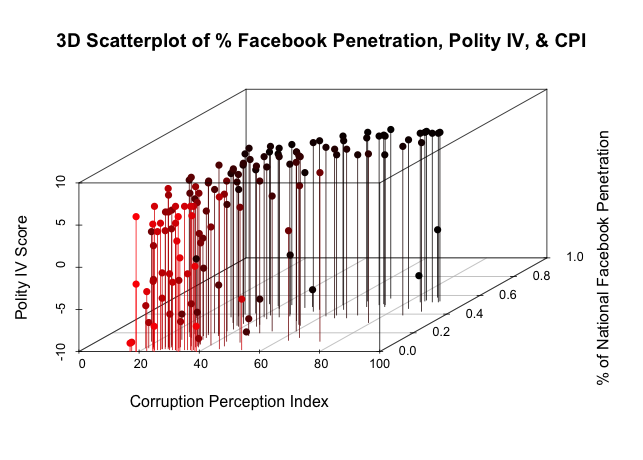Facebooking To End Corruption?

We know that corruption grows and spreads in areas where public accountability is low. The question is how can technology facilitate public accountability and better governance? Over the last few weeks I started collecting data on corruption and comparing it to various attributes of countries within a single year, 2012.
For a very preliminary look at the role of technology in influencing democracy I have examined how social networks, principally Facebook, influence the perception of corruption within countries. What I have found hints at something important in the Tech4Dem space. I developed a basic model based on the premise that societies with higher usage of social networks are inherently more engaged and therefore are more likely to have lower perceptions of corruption.
I examined 137 countries using the Corruption Perception Index (2012) from Transparency International, polity scores (2011 scores are used to insure a lagged effect and prevent current event bias) from the Polity IV project, Facebook penetration data from Socialbakers and GDP data from the World Bank.
What I find is that Facebook significantly influences the perception of corruption in a given country. The perception of corruption is likely reduced due to multiple factors including the more rapid transmission of information and increased communications between citizens and their government. Simply incorporating measures of democratic and economic status and Facebook penetration percentages can explain approximately 55.35% of the variation in corruption perception within the countries included in the sample. Each of these variables is to some extent significant. However, the variable with the most influence on overall perceptions of corruption is Facebook penetration. This means that even when controlling for high-economic development and democratic status, citizens in a country with higher Facebook penetration percentages actually perceive their country to be less corrupt.
The preliminary evidence indicating Facebook’s role in the perception of corruption begs the question of why? Are citizens actually more engaged in their societies or do they just feel more engaged and does it actually matter? These are questions I will delve into more deeply in the coming months for an academic paper.
What is evident and what is possible to discuss is a clear relationship between Facebook and perceptions of corruption. So the next time you are updating your Facebook status or tweeting what you are doing and your boss sees you do it and gives you a disapproving look, simply turn around and say: “Hey, I am helping to reduce national perceptions on corruption.”
If you would like to join the discussion on this topic or send me resources or ideas for this ongoing research project please hit us up at @NDITech or me personally at @abrantlyndi.
